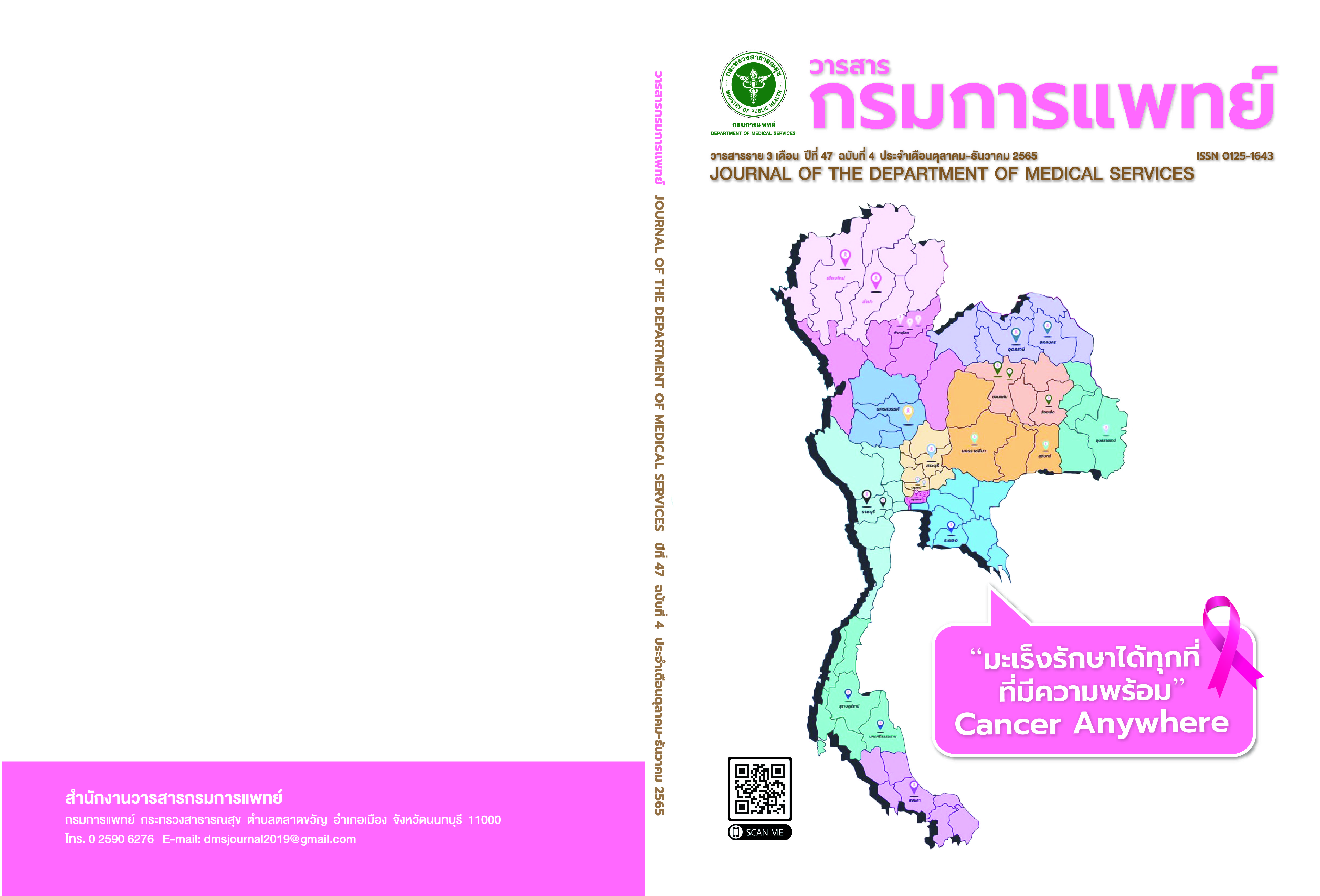Factors Associated with Exclusive Breastfeeding of Rajavithi Hospital Staff
Keywords:
Breastfeeding, Exclusive breastfeedingAbstract
Background: Breastfeeding provides the best nutrients for infants. Thus, infants should be exclusivelybreastfed during their first 6 months, according to the recommendation by the World Health Organization and UNICEF. After that, they should both receive age-related supplements and be breastfed until they are 2 years old. At the present time, the rate of breastfeeding tends to decrease. A study from the Department of Health has stated that there is only 23.6 percent of mothers that breastfeed their children. However, breastfeeding is found to be fundamental for children’s physical, mental, and emotional growth. Objective: This study aims to examine factors related to the success of breastfeeding of staff at Rajavithi Hospital. Method: This descriptive research collected data from female staff working at Rajavithi hospital with children aged from 6 months to 4 years old. In which the staff brought their children to the breastfeeding clinic, the day-care center, or the well-being development center at Rajavithi Hospital. A questionnaire with a rating scale was used as a tool for gathering data. Frequency, percentage, mean, standard deviation, and Chi-Square analysis were used as required parameters. Result: The success rate of breastfeeding was 49.0%. Factors related to the success of breastfeeding were the attitude toward breastfeeding, the experience of breastfeeding, and the service of the breastfeeding clinic, which provided statistical significance at p-value .05. Conclusion: The attitude toward breastfeeding, the experience of breastfeeding, and the service of the breastfeeding clinic are factors associated with the success of breastfeeding
References
Arifeen S, Black RE, Antelman G, Baqui A, Caulfeld L, Becker S. Exclusive breastfeeding reduces acute respiratory infection and diarrhea deaths among infants in Dhaka slums. Pediatrics. 2001;108: E67.
Bachrach VR, Schwarz E, Bachrach LR. Breastfeeding and the risk of hospitalization for respiratory disease in infancy: a meta-analysis. Arch Pediatr Adolesc Med. 2003;157:237-43.
Horta BL, Loret de Mola C, Victora CG. Long-term consequences of breastfeeding on cholesterol, obesity, systolic blood pressure and type 2 diabetes: a systematic review and meta-analysis. Acta Paediatr. 2015; 104:30-7.
Quigley MA, Kelly YJ, Sacker A. Breastfeeding and hospitalization for diarrheal and respiratory infection in the United Kingdom Millennium Cohort Study. Pediatrics. 2007;119: e837-42.
Word Health Organization. The optimal duration of exclusive breastfeeding: report of an expert consultation [Internet]. Geneva: WHO; [cited 2020 Aug 17]. Available from: http:// www.who.int/nutrition/publications/optimal_duration_of_exc_ bfeeding_report_eng.pdf
National Statistical Offce Thailand 2020. Survey of the situation of children and women in Thailand 2019 [Internet]. Bangkok: National Statistical Offce Thailand; 2020 [cited 2021 July 27]. Available from: http://www.nso.go.th/sites/2014/DocLib13/ด้านสังคม/สาขาประชากร/สถานการณ์เด็กและสตรี/2562/MICS6_report_071063.pdf
Plewma P. Prevalence and factors influencing exclusive breast-feeding in Rajavithi Hospital. J Med Assoc Thai. 2013; 96 Suppl 3: S94-9.
Susanha Y. Breastfeeding Promotion among Outside Employed Mothers. Journal of Nursing 2013; 40: 129–37.
Puapornpong P. Breastfeeding Assessment. Journal of Medicine and Health Sciences 2014; 21: 4-15.
Arayasukawat P, Sukonkajorn P, Phothiraksanon P, Jarernrat P , Aungsakul W, Bannarakna R, et al. Breastfeeding Practice Knowledge of Mothers Who Delivered at Srinagarind Hospital. Srinagarind Med J 2013; 28:163–9.
Sangkla J. Factor associated with exclusive breastfeeding: A case study in a semi- urban area, Kanchanaburi. [Thesis]. Bangkok: Mahidol University; 2013.
Weerakul J. Factor affecting exclusive breast feeding at least 6 months in Naresuan University hospital. Naresuan Research 12: Research and Innovation and Development Country 2015; 746-57.
Thaunthong S. Perception and maternal readiness affecting breast feeding during the frst six months, Maharaj Nakorn Chiang Mai Hospital. [Thesis]. Chiang Mai: Chiang Mai University; 2013.
Suebnuson P. Intention Breastfeeding for at Least Six Months of Antenatal Women in Nakhonnayok, Nakhonnayok Province. [Thesis]. Chon Buri: Burapha University; 2012.
Ornlaor S, Klunklin P, Urharmnuay M . Factors predicting breastfeeding among mothers of preterm infants. Journal of Faculty of Nursing Burapha University 2016; 24: 32-42.
Apartsakun P. Discouraging Factors of Breastfeeding among Thai women. J Pub Health Nurse [Internet]. [cited 2021 Jul 21]; 30(2): 33-46. Available from: https://he01.tci-thaijo.org/index.php/phn/article/view/68066
Lertsakornsiri M, Saibae S. The Relationship between Selfeffcacy, Self-esteem, Attitude Toward Breastfeeding and Breastfeeding Behaviors in the First-time Teenage Postpartum Mothers. Journal of Nursing and Education 2018. 11: 10-23.
Chuprapan P, Thiangthum W, Pichayapinyo P. Exclusive breastfeeding within a 6 months’ period among mothers in south central region of Thailand. In: Graduate Research Conference 15th; 2014 March 28; the College of Local Administration Khon Kaen University. Khon Kaen: Khon Kaen University; [2014]. p.1723-32.
Downloads
Published
How to Cite
Issue
Section
License
Copyright (c) 2022 Department of Medical Services, Ministry of Public Health

This work is licensed under a Creative Commons Attribution-NonCommercial-NoDerivatives 4.0 International License.
บทความที่ได้รับการตีพิมพ์เป็นลิขสิทธิ์ของกรมการแพทย์ กระทรวงสาธารณสุข
ข้อความและข้อคิดเห็นต่างๆ เป็นของผู้เขียนบทความ ไม่ใช่ความเห็นของกองบรรณาธิการหรือของวารสารกรมการแพทย์



